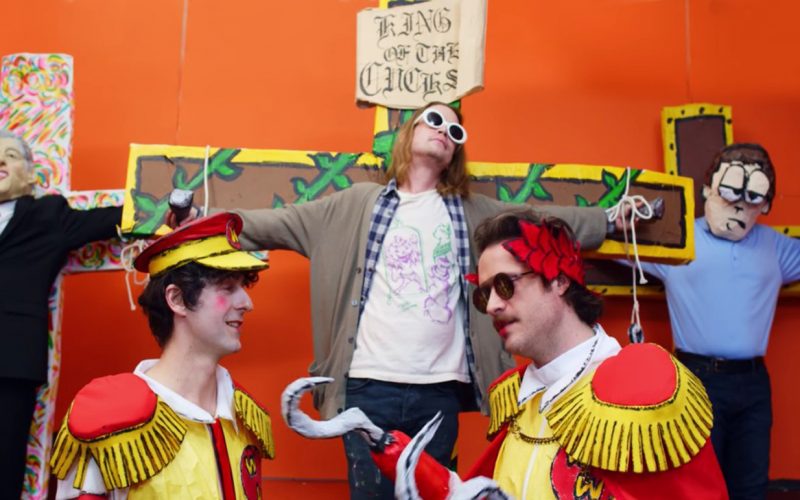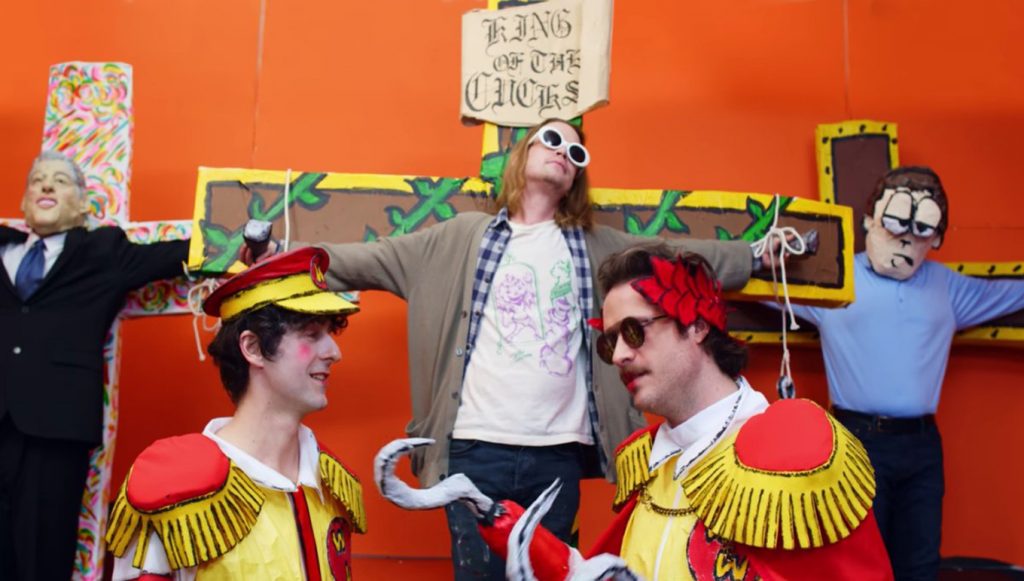-
Courtesy Image/YouTube
In the music video for “Total Entertainment Forever” by Father John Misty, Kurt Cobain is crucified alongside President Bill Clinton and John Arbuckle by Misty and some goons dressed in McDonald’s-themed attire. The whole scene takes place within a virtual reality headset worn by George Washington.
Earlier this year, Josh Tillman, via his witty Father John Misty alter-ego character, released his third record: Pure Comedy. To date, the reviews of Pure Comedy have highlighted the record’s themes of entertainment, capitalism, religion and how they are summarily dressed down by the narrator. Which, he at times seems almost too exhausted to discuss these topics.
For me, the beauty of the record wasn’t the fact that I simply identified strongly with the narrator, it was why I identified so strongly with the narrator; we’re both trying to navigate a society run, by and large, by the inwardly emotional Millennial generation, and all of the gadgets and widgets they’ve created to assuage their woe, but we’re doing so from the perspective of outwardly emotional, angsty members of my generation, “Generation X” — those born in the mid 60s through the early 80s — and it’s pissing us off.
In the video for “Total Entertainment Forever”, a George Washington-like figure opens a box containing a virtual reality headset. He dials in an “episode” of what appears to be Kurt Cobain (the lead singer of the seminal 90s grunge band Nirvana – and the fact that I feel compelled to include this parenthetical only agitates me further) played by Macaulay Culkin of Home Alone fame, and characterizations of Jon Arbuckle (Garfield the cat’s owner) and President Bill Clinton being crucified by a crew of Ronald McDonald-looking ‘McWorkers” dressed in yellow, white, and red ‘clown-like’ suits.
Cobain, a ‘Savior’ of sorts, is crucified for being ‘woke;’ inspiring a generation to shun, and thus negatively impacting, the McCorporitization of the world. This video screams “Generation X malaise,” and I argue that it’s central to the Father John Misty character.
I am not the only person to say the following, but yeah, Kurt Cobain was “the voice of a generation” or, “the Generation X Savior”, or some other moniker he likely never wanted. Regardless, the generation of kids in the early to mid 90’s — my generation — needed someone to speak up for us because our latchkey slacker-asses certainly weren’t motivated to do it ourselves. Cobain was our Jesus.
If you’re a “Gen Xer”, the term “latchkey kid” is not foreign. While mom and dad were hustling that nine to five (or longer) job, they gave us a key to the house. We would come home from school to find a note saying “There is a TV dinner in the freezer. Microwave it for two minutes. Don’t forget to do your chores and homework. Afterward you can watch TV. We’ll be home around 8:00 p.m.” You can imagine what happened next… (he fixes the cable?)
Unsupervised, the world was our oyster. MTV was the pearl. It was the visualization of the 80s – 90s zeitgeist; generation X was right in the middle of it all. But something was afoot in the late 80s. This whole being a latchkey kid was exhausting, yet we endured. After all, what was the alternative?
Then 1991 happened.
Circa 1991, as we latchkey kids went about our schooling, coming home to our empty houses, eschewing mom and dad’s ‘to-do’ list to instead flip on MTV…it happened. Most Gen X’ers remember, like our parents with the Kennedy assassination, where we were when we first heard those four chords and saw that scruffy blond- haired dude in a school gymnasium full of kids wearing flannel shirts; cheerleaders with the f***ing anarchy “A” on their uniforms, thrashing to a blistering song with a line that encapsulated all our feels in six words: “Here we are now…entertain us.”
That line was everything. It was “Damnit, mom and dad! We’re sick of having to do all this shit on our own. We’re tired of only getting to see you guys for an hour before going bed, rinse and repeat. We’re tired of TV dinners. We’re tired of being by ourselves. We. Are. Bored! Here we are, now. ENTERTAIN US!”
But we didn’t just sit our folks down and ask them to be a bigger part of our lives. We did it with our actions. We wanted to be in that gymnasium, thrashing around to this music with long, unkempt, dyed, hair, combat boots, and flannel shirts.
And so we did.
Nirvana, and grunge music, with its loud, abrasive, noisy, guitar-driven, angst-y, anarchy-fueled, attention getting music was just what Gen Xers needed to get someone — anyone — mostly our parents — to look at us. The noise! The fashion! Dirty, baggy, torn clothing. Ratty flannel shirts. Combat boots. Long hair. Crazy, wild, colored hair. Pay attention to us!
And drugs. Marijuana, mushrooms, ecstasy, heroin. Hell. We could get away with doing a lot of crazy stuff because our parents weren’t watching.
Does this apply to every Gen Xer? No. But it certainly applied to more than a few.
The cultural message in the early to mid 90s was ‘Us vs Them.’ Kids versus the world. Grunge was the soundtrack: Kill your television. Don’t be a “poseur!” Be an individual. Don’t copy others. Don’t embrace the corporate shill lifestyle (like our parents did). Money, power, fame…that’s not for us. Let’s destroy all that. Crank the amps and let the feedback squeal! You f***ing hear that Mom and Dad?!
However, much to the chagrin of the Gen Xer, the corporatization of “grunge” occurred. Nordstrom et. al. started selling ripped jeans and flannel shirts. Nirvana, Pearl Jam, Soundgarden, Alice in Chains, all had signed to major labels and were in heavy rotation on Top 40 radio, MTV, and the like.
We started feeling like the corporate asshole “suits” crept in and stole our bands from us… our music. Our parents started listening to these bands, too. This thing that belonged to us was all of a sudden co-opted by them.
Then Cobain committed suicide.
That action in April of 1994 was the death knell for this scene. Cobain’s funeral seemed to extinguish the raging bonfire of cultural synergy Gen Xers were experiencing. Schools brought in counselors and psychologists so kids could talk through the tragedy. Those who weren’t in the scene made fun of us, not unlike conservatives today make fun of liberals who need “safe spaces.”
Eventually, the grunge movement died a lonely, unceremonious death. The corporate grunge acts became mainstream, and we quit listening. The next wave of kids (read: the Millennial generation) was stepping up, and rather than embrace the brooding world of grunge, hip hop and boy/girl band pop took over.
By this point, many Gen Xers were in, or through, college. Other aspects of our lives were taking over. We no longer needed to fight the corporate/parental system. We were becoming part of it.
Then we Gen Xers started having kids, and vowed to never treat our children like our parents treated us. We coddled our Millennial children. The term “helicopter parent” was coined. Gen Xer parents got their Millennial kids involved in everything: soccer, band, baseball, piano lessons, dance, church groups, volunteering, community service. You were told that you could do anything you wanted, and that your parents wouldn’t judge you. We, your parents, are paying attention to you! We are part of your lives! We love you more than anything!
Gone were the days when kids would retreat to their rooms and listen to music, pour over the liner notes, or watch MTV at the house while waiting for your parents to return home from work. Gen Xers-as-parents kept their millennial children protected in little self-righteous, super-involved safety bubbles.
MTV, as a medium for music discovery, was dead. In the aughts, society embraced the MP3s, YouTube, iTunes, Napster, LimeWire, Soulseek, etc. Music was no longer something you supported by purchasing two cassettes at the mall with the $20.00 you earned mowing lawns. Music became something you pillaged off the internet song by song.
The internet became the foundation for Millennials’ protective bubble.
The internet. Smart phones. Social media. All used to connect to people from afar, not live and in-person. It was technology that bridged generations. Unlike Gen Xers, Millennials didn’t care that other generations wanted in on their game, so long as they never had to leave The Bubble™.
It got (is getting?) out of hand. Our “bubbles” breed seclusion. Conversations occur via text message, chat window, and social media wall – less so than face to face. We express our feelings using memes and emojis. We’re all in our “bubbles” where we can say anything, as nice, mean, political, anti-social, sexist, racist, as we like, but it’s cool because nobody can hurt us. Our “bubble” only connects with others who are just like us. Homogeneity is bliss.
In walks Josh Tillman’s Father John Misty, who, from 30,000 feet sees all this going on and from his classic anti-corporate, anti-fad, Gen X station reminds us that what we are seeing is utter bullshit.
Indeed, rather than use a meme, or some internet chat to call it out, he uses the universal unifying format: music.
I think Father John Misty realizes the social power of music — and Pure Comedy is his reminder, his push notification, his ping, his poke… you get the drift. With this, the Father John Misty character is the classic Gen Xer. Brooding, anti-corporate, anti-fad, anti-millennial-bubble-living-wimp pointing out our asinine priorities. Who gives a shit whether Beyoncé is pregnant when we’re flushing so many unused pills town the toilets and trash, that our water supply now provides a source of ecstasy and birth control. But Pure Comedy encourages us to burst our respective “bubbles”. Let’s all come together at a show and get woke AF!
Aw hell. Who am I kidding? You’re probably reading this on your phone.




